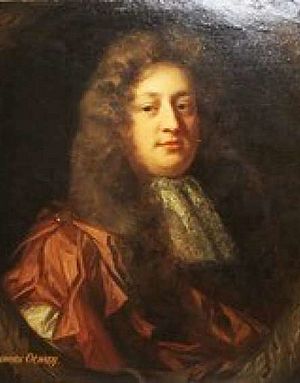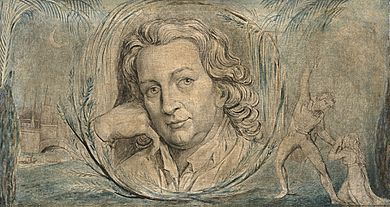Thomas Otway facts for kids
Quick facts for kids
Thomas Otway
|
|
|---|---|

Portrait of Thomas Otway by John Riley, c. 1680–85
|
|
| Born | 3 March 1652 Trotton, Sussex, England
|
| Died | 14 April 1685 (aged 33) |
| Burial place | St Clement Danes |
| Nationality | English |
| Occupation | Dramatist |
| Years active | 1672–1685 |
| Known for | Venice Preserv'd |
Thomas Otway (March 3, 1652 – April 14, 1685) was an English dramatist. He lived during the Restoration period, a time when the monarchy was brought back to England. Otway is best known for his play Venice Preserv'd, or A Plot Discover'd, which came out in 1682.
Contents
Early Life and Education
Thomas Otway was born in Trotton, a village near Midhurst in England. His father, Humphrey Otway, was a church leader there. Thomas grew up in Woolbeding, a nearby area, and it was expected that he would also become a priest.
He went to Winchester College, a famous school. In 1669, he started studying at Christ Church, Oxford, a well-known university. However, he left Oxford in 1672 without finishing his degree. While at Oxford, he met Anthony Cary, 5th Viscount Falkland, who helped him discover a love for books.
Moving to London and Early Career
After leaving university, Otway moved to London. There, he met Aphra Behn, a famous female playwright. In 1672, she gave him a small acting part in her play, Forc'd Marriage. But Otway suffered from severe stage fright (fear of speaking in public). He performed very poorly and never acted on stage again.
In the same year, his father passed away. This led Otway to decide against becoming a priest. He chose to stay in London and become a playwright instead. This is where he found his true calling.
Love and Hardship
Otway fell in love with Elizabeth Barry, a leading actress of his time. She often played the main female roles in his plays. Otway wrote her many letters, but it seems she did not return his strong feelings.
In 1678, Otway faced financial difficulties. He joined the army and served in the Netherlands. However, the English troops were sent home in 1679 without much support. Otway returned to London in a very poor state.
He continued to struggle with poverty. At one point, he taught the son of Nell Gwyn, a famous actress. Thomas Otway died in great poverty on April 14, 1685. He was buried two days later in the churchyard of St. Clement Danes.
Writing Plays

In 1675, Thomas Betterton, a famous actor and theater manager, produced Otway's first play, Alcibiades. This was a tragedy, a serious play with a sad ending. It was performed at the Dorset Garden Theatre, where most of Otway's plays would later be shown.
Otway's next play, Don Carlos, Prince of Spain (1676), was a big improvement. It was based on a French novel. This play introduced two types of characters often seen in Otway's works. Don Carlos is a quick-tempered, unstable young man, perhaps like Otway himself. The queen's role is a gentle, sad character, similar to his later heroines. This play earned more money than any other modern tragedy before it.
In 1677, Otway adapted two French plays for the English stage: Titus and Berenice from Jean Racine and The Cheats of Scapin from Molière. In 1678, he wrote an original comedy, Friendship in Fashion, which was very popular.
Masterpieces of Tragedy
In February 1680, Otway's first major tragedy, The Orphan, or The Unhappy Marriage, was performed. Mrs. Barry played the main role of Monimia. This play was written in blank verse, a style similar to Shakespeare. Its success came from Otway's skill in showing deep sadness and emotion through his characters.
The History and Fall of Caius Marius, also from 1680, combined Shakespeare's Romeo and Juliet with the Roman story of Marius. This play was incredibly popular for many years, even more so than Romeo and Juliet itself.
In 1682, Otway's most famous play, Venice Preserv'd, or A Plot Discover'd, premiered. The story was inspired by a French book about a conspiracy in Venice in 1618. Otway changed the story quite a bit. He created the character of Belvidera, who is one of his most famous heroines.
The play also touched on political issues of the time. It hinted at the "Popish Plot", a false story that made many people in England suspicious of Catholics. Otway used the play to show his frustration with these political scandals. For example, one character, Antonio, was a caricature of Anthony Ashley Cooper, 1st Earl of Shaftesbury, a leader of the Whig political party.
Venice Preserv'd was an instant success. It was translated into many languages across Europe. Even John Dryden, another famous writer, praised it, saying it showed "Nature," which meant it felt very real.
The Orphan and Venice Preserved remained popular plays for a long time, even into the 1800s. Many leading actresses loved to play the roles of Monimia and Belvidera.
Otway's last play was The Atheist (1684). Some people see it as a clever experiment, exploring what happens after characters get married in plays.
Other Works and Legacy
Besides his plays, Otway also wrote some poems, like Windsor Castle (1685), which praised King Charles II. He also translated a French book called History of the Triumvirates (1686).
His collected works, The Works of Mr. Thomas Otway, were first published in 1712. Many other editions followed over the years, showing how important his plays were.
See also
 In Spanish: Thomas Otway para niños
In Spanish: Thomas Otway para niños
 | Janet Taylor Pickett |
 | Synthia Saint James |
 | Howardena Pindell |
 | Faith Ringgold |

